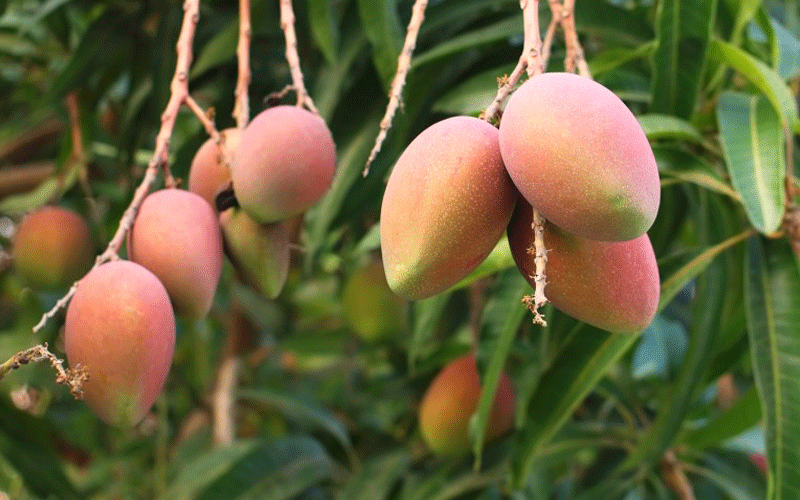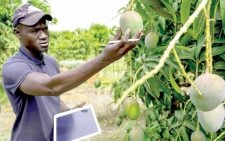Makueni’s gold: How fruit farmers in the county are benefitting from juice

Ukambani region has long been synonymous with the finest mangoes. In Kenya, mangoes are often categorised into two groups: the ordinary ones and those from Ukambani.
The latter hold a special place in the hearts of many, celebrated for their rich flavour, juiciness, and fleshy texture mangoes have it. A single bite of a Ukambani mango is enough for any Kenyan to instinctively recognise its origin. A typical Kenyan would say,”hii haiwezi kosa ni ya ukambani.” This must be from Kambaland.
Makueni county, the undisputed leader in mango production, has cemented its place as the fruit capital of Kenya. With over four million mango trees flourishing across the county, farmers have reaped immense benefits from the bountiful harvests. Makueni exported mangoes worth over Sh300 million last season alone, in what is a remarkable achievement that underscores the county’s dominance in the market.
For years, local farmers primarily exported raw mangoes, leaving them at the mercy of fluctuating market prices and middlemen. However, the focus on selling raw mangoes has evolved into a thriving juice-making industry, generating even more revenue for smallholder farmers while bolstering the county’s economy.
The establishment of the Makueni Fruit Processing Plant, managed by the Makueni County Fruit Development Authority transformed the region’s agribusiness landscape. Today, farmers have a stable and profitable outlet for their produce, ensuring sustainable incomes and reducing post-harvest losses.
Emma Nthiwa, a mango and orange farmer in Makueni, is among those whose lives have been reshaped by fruit farming. With 25 mango trees producing different varieties, she no longer struggles to make ends meet. “My life has changed significantly. I can now support myself and pay my children’s school fees,” she shares. Her story is echoed by many farmers who have embraced fruit cultivation as a pathway to financial independence.
Lucrative ventures
Haron Muthini, another farmer in Makueni says after earning his degree in General Agriculture in 2019, he returned home to pursue his passion for agribusiness. Today, he manages an eight-acre farm with 1,400 pixie trees. A kilogramme of his high-quality pixies fetches Sh150, and with each tree capable of producing up to 120 kilograms, his annual output exceeds 150 tonnes. His decision to return to farming has paid off, proving that agriculture remains one of the most lucrative ventures in the region.
Another success story is Peter Mwaka, widely regarded as the kingpin of pixie farming in Makueni. His 30-acre citrus farm is a beacon of prosperity, demonstrating the immense potential of investing in fruit farming. His journey, however, was not always smooth.
In 2010, he made the bold decision to resign from his teaching job and focus entirely on farming. “That year alone, I made more money than I ever had in my entire teaching career,” he says. His success has inspired many others to follow in his footsteps.
Despite the promise of wealth, fruit farmers in Makueni have faced significant challenges, particularly market instability. The influx of produce led to a sharp decline in fruit prices, forcing farmers to sell their crops at throwaway prices. Worse still, surplus fruit would often rot due to a lack of buyers. The unpredictability of the market threatened the livelihoods of many farmers who had invested heavily in fruit production.
Recognizing these challenges, the Makueni County government stepped in with a game-changing solution: the establishment of the Makueni Fruit Processing Plant. This initiative aimed to add value to the fruit industry, ensuring better prices for farmers and minimizing post-harvest losses. “The purpose of the factory was to add value to mangoes and secure better prices for our farmers,” explains Makueni Governor Mutula Kilonzo Jr. “At the time, mangoes were being sold for next to nothing, and in some cases, they were being thrown away or used as animal feed because there were no buyers.”
The plant’s operations revolve around producing mango puree and juice, effectively positioning mangoes as a strategic value chain product. The national government has since incorporated mangoes into its value chain development program, facilitating agreements with international markets, including the European Union. With increased global recognition, Makueni’s mango industry is poised for even greater expansion.
Value chain product
The processing plant sources fruits from various cooperatives, which in turn collect produce from local farmers. The result is a streamlined and efficient supply chain that benefits both the farmers and the market. The factory produces Makueni Mango Fruit Juice, a premium product that is sold both locally and internationally. Its success has not only uplifted individual farmers but has also boosted the county’s economic standing.
The impact of the fruit processing plant extends beyond financial gains. It has fostered a sense of stability among farmers, who no longer worry about fluctuating market prices or wasted produce. With a guaranteed market for their fruits, more farmers are now investing in quality production, ensuring that Makueni maintains its reputation as the home of Kenya’s best mangoes and pixies. The plant has become a cornerstone of economic resilience, providing employment opportunities and contributing to food security.
For thousands of fruit farmers in Makueni, the processing plant is more than just a facility; it is a lifeline. The transformation of their produce into high-value products has unlocked unprecedented economic opportunities, proving that value addition is the key to sustainable agribusiness. As demand for Kenyan mangoes continues to grow, Makueni’s farmers are reaping the rewards of their hard work, securing not only their futures but also solidifying their place in Kenya’s agricultural success story.















